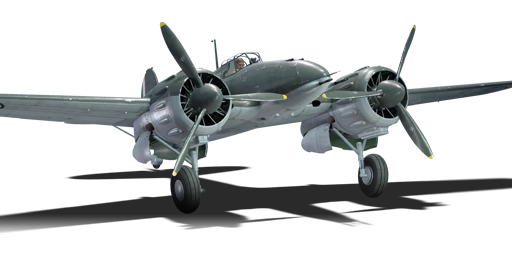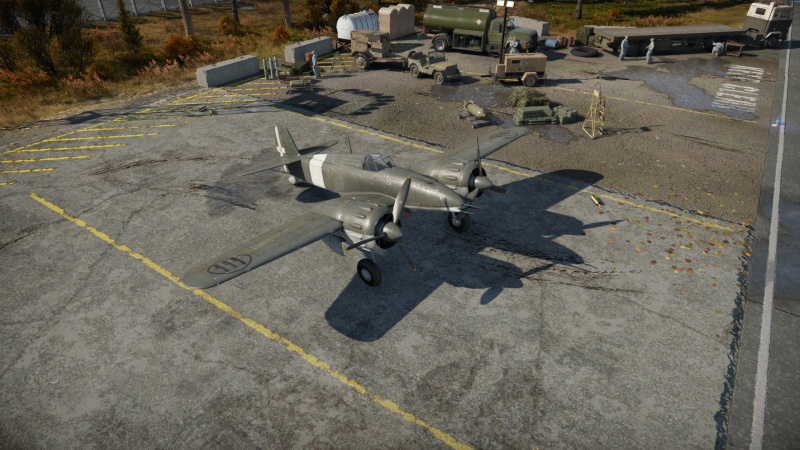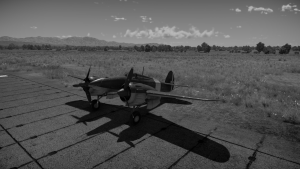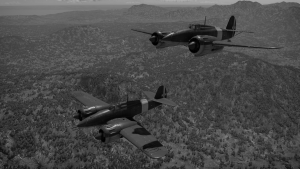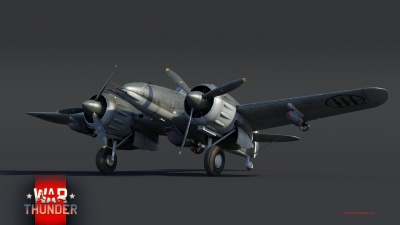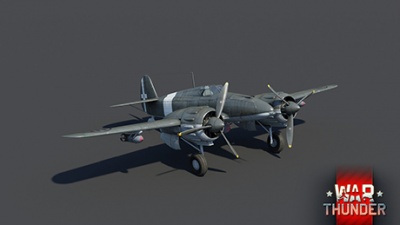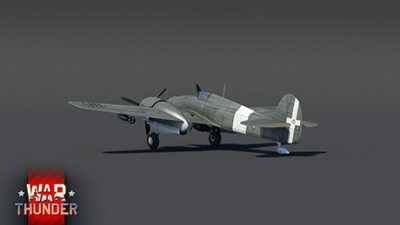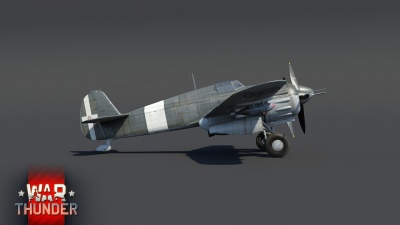Difference between revisions of "Ro.57 Quadriarma"
(→History: done) (Tag: Visual edit) |
m (→History) (Tag: Visual edit) |
||
| Line 192: | Line 192: | ||
'''History Service''' | '''History Service''' | ||
| − | [[File:Ro.57 Quadriarma during training.png|thumb|Ro.57 | + | [[File:Ro.57 Quadriarma during training.png|thumb|Ro.57 during training]] |
In spite of these defects, the Regia Aeronautica's shortcomings in the field of assault aircraft led, at the end of 1942, to an order for 200 units of the Ro.57 Bis, later reduced to 110. Of these, according to the registration numbers, 75 were built before September 8, 1943, and between 50 and 60 were actually delivered to the Regia Aeronautica (which assigned them to the 97º Gruppo Tuffatori, 226ª and 227ª squadriglia). The aircraft had no importance in the war events, as the pilots who were in charge of them were not able to finish the training on the new machines before most of the aircraft were destroyed on the ground on July 13, 1943 due to a bombing conducted by B-24 on the field of Crotone Isola Rizzuto (now Crotone Airport), intended to annihilate the Reggiane Re.2002 of the 5°Stormo and Fiat G.50 of the 50°Stormo that had repeatedly hit the Allied ships engaged in the Landing in Sicily. | In spite of these defects, the Regia Aeronautica's shortcomings in the field of assault aircraft led, at the end of 1942, to an order for 200 units of the Ro.57 Bis, later reduced to 110. Of these, according to the registration numbers, 75 were built before September 8, 1943, and between 50 and 60 were actually delivered to the Regia Aeronautica (which assigned them to the 97º Gruppo Tuffatori, 226ª and 227ª squadriglia). The aircraft had no importance in the war events, as the pilots who were in charge of them were not able to finish the training on the new machines before most of the aircraft were destroyed on the ground on July 13, 1943 due to a bombing conducted by B-24 on the field of Crotone Isola Rizzuto (now Crotone Airport), intended to annihilate the Reggiane Re.2002 of the 5°Stormo and Fiat G.50 of the 50°Stormo that had repeatedly hit the Allied ships engaged in the Landing in Sicily. | ||
Revision as of 13:21, 30 August 2021
Contents
Description
The Ro.57 Quadriarma is a premium gift rank II Italian strike aircraft with a battle rating of 2.7 (AB/RB/SB). It was introduced during Update "Hot Tracks" as a reward for the 2020 Operation W.I.N.T.E.R. event.
General info
Flight performance
The Ro.57 is quite manoeuvrable for a strike aircraft, with a great roll rate and turn time, and will most likely be able to win turn fights with other twin-engine aircraft. However, remember, the Ro. 57 is not a turn fighter, and should not be used as such. In addition, it's rather slow for its BR, so keep that in mind when chasing enemies.
| Characteristics | Max Speed (km/h at 5,000 m) |
Max altitude (metres) |
Turn time (seconds) |
Rate of climb (metres/second) |
Take-off run (metres) | |||
|---|---|---|---|---|---|---|---|---|
| AB | RB | AB | RB | AB | RB | |||
| Stock | 451 | 436 | 8850 | 22.9 | 23.9 | 10.2 | 10.0 | 415 |
| Upgraded | 480 | 466 | 21.2 | 22.0 | 15.0 | 12.5 | ||
Details
| Features | ||||
|---|---|---|---|---|
| Combat flaps | Take-off flaps | Landing flaps | Air brakes | Arrestor gear |
| ✓ | ✓ | ✓ | ✓ | X |
| Limits | ||||||
|---|---|---|---|---|---|---|
| Wings (km/h) | Gear (km/h) | Flaps (km/h) | Max Static G | |||
| Combat | Take-off | Landing | + | - | ||
| 0 | 320 | 470 | 337 | 280 | ~14 | ~6 |
| Optimal velocities (km/h) | |||
|---|---|---|---|
| Ailerons | Rudder | Elevators | Radiator |
| < 380 | < 280 | < 520 | > 250 |
Survivability and armour
- No armour
- Self-sealing fuel tanks (1 in front of the ammunition for armament, 1 behind pilot, 1 in rear fuselage)
Modifications and economy
Armaments
Offensive armament
The Ro.57 Quadriarma is armed with:
- 2 x 20 mm Hispano 404 cannons, nose-mounted (60 rpg = 120 total)
- 2 x 12.7 mm Breda-SAFAT machine guns, nose-mounted (350 rpg = 700 total)
Suspended armament
The Ro.57 Quadriarma can be outfitted with the following ordnance:
- Without load
- 2 x 50 kg GP 50 bombs (100 kg total)
- 2 x 100 kg SAP 100M bombs (200 kg total)
- 2 x 100 kg GP 100T bombs (200 kg total)
- 2 x 160 kg A.P 160 bombs (320 kg total)
- 1 x 250 kg GP 250 bomb + 2 x 100 kg SAP 100M bombs (450 kg total)
- 1 x 250 kg GP 250 bomb + 2 x 100 kg GP 100T bombs (450 kg total)
- 1 x 250 kg GP 250 bomb + 2 x 160 kg A.P 160 bombs (570 kg total)
- 1 x 500 kg GP 500 bomb (500 kg total)
Usage in battles
At the start of the battle, climb as high as you can. Use the air spawn to your advantage. Intercepting bombers is usually your main job as an interceptor. Head-on engagements are an option as you have good frontal armaments located in the nose. If you are engaged by a fighter, don't hesitate to turn fight. Your turn rate with combat flaps is much better than it may appear and is sometimes on par with even the Spitfire's turn rate under the right conditions. Boom and Zoom can be done but do so with extra caution as you will be chased quite easily by enemy fighters.
CAS support
The Ro.57 Quadriarma is a champion in Close Air Support at its Battle Rating. With its cannons and payload it is capable of completely turning around the fortunes of a lost game. The most effective equipment we recommend is as follows:
2 160 kg bombs and 1 250 kg bomb, while with regard to the ammunition of the cannons recommend bringing the tracer bullets for the fifty caliber and anti-tank bullets for the twenty millimeters. In order to approach a swooping land enemy we recommend to take sufficient altitude to drop the bombs. Recall that the launching device of the central bomb is similar to that of the stuka, so consider having to stay in a dive for about 2 or 3 seconds before the central bomb is released from the mini catapult, in this situation you can extend the aero brake in order to slow down further and be more accurate with the bombs. For the bombs on the wings instead there are no problems, those are released immediately.
Air Superiority
In addition to being a good CAS the Quadriarma can play a very important role in air superiority, in this case we do not recommend equipping bombs, or if you are in a realistic land, make sure you have dropped the bombs before you devote yourself to air superiority. In this area we recommend arming the Ro. 57 with tracer bullets for the 12.7 and the Universal belt for the 20mm. We strongly suggest adopting the Energy Fighter style of play with the Quadriarma, even if it doesn't look like it once acquired the right combat energy it turns into an excellent fighter.
Manual Engine Control
| MEC elements | ||||||
|---|---|---|---|---|---|---|
| Mixer | Pitch | Radiator | Supercharger | Turbocharger | ||
| Oil | Water | Type | ||||
| Controllable | Controllable Not auto controlled |
Controllable Auto control available |
Controllable Not auto controlled |
Separate | Not controllable 1 gear |
Not controllable |
Pros and cons
Pros:
- Lethal nose-mounted armament
- Can fly on a single-engine
- Above-average durability
- Decent speed and climb for a twin-engine aircraft of its rank
- Agile for a twin-engine aircraft
- Versatile payloads for many situations
- Relatively short take-off run
- Equipped with airbrakes, allowing for dive-bombing and easy landings
Cons:
- Limited ammunition for the cannons
- Low muzzle velocity on the Breda-SAFAT machine guns
- No armour
- Engine prone to overheating with at high power
- Bomb trapeze creates a delay between pressing the release button and the bomb actually dropping
- Carrying any payload reduces the excellent handling
History
History
IMAM Ro.57 was projected and developed by Giovanni Galasso an aeronautical engineer, and was built by IMAM (Industrie Meccaniche Aeronautiche Meridionali).
The first prototype flew in 1939 and the IMAM technicians proposed the Ro.57 to the Regia Aeronautica as a Dive Bomber but in 1939 the Regia Aeronautica was not interested.
At the demonstration of the IMAM Ro.57 the armament was composed by only two 12,7mm Breda-SAFAT and it has 2 powerful Fiat A.74 R.C.38 engines with 840 HP each and the plane have a maximum speed of 501 Km/h at 5250 Meters of altitude.
After 2 years, during 1941, after the failure of Breda Ba.88 as an attacker, the Regia Aeronautica decided to return to the Ro.57 project and go after it to make it a complete attacker.
And were created 2 variants :
IMAM Ro.57 Quadriarma
In addition to the ventral attachment for a 500 kg bomb, two sub-alar rafters were added for bombs up to 250 kg, a ventral window (necessary for targeting) and aerodynamic dive brakes.
The plane got a new armament with addition of two 20mm Hispano 404 plus the two 12,7mm Breda-SAFAT already in the previous tests and prototypes and the motors were the same.
This variant is obscure because the put the Hispano 404 after they removed for only a test usage
History Service
In addition to the ventral attachment for a 500 kg bomb, two sub-alar rafters were added for bombs up to 250 kg, a ventral window (necessary for targeting) and aerodynamic dive brakes.
The plane got a new armament with addition of two 20mm MG 151/20 plus the two 12,7mm Breda-SAFAT already in the previous tests and prototypes and the motors were the same
When all was said and done, the aircraft was renamed IMAM Ro.57 Bis. The aerodynamic obstruction of the rafters, the ventral window, the aerodynamic brakes and the tailwheel brought the maximum speed down to 480 km/h. Worse still, due to a strange aerodynamic interference, the oil cooler of the right engine provided insufficient cooling, causing a tendency for the engine to overheat at maximum revs, while the aircraft was unstable when sinking, thus compromising the accuracy of the dive bombing.
History Service
In spite of these defects, the Regia Aeronautica's shortcomings in the field of assault aircraft led, at the end of 1942, to an order for 200 units of the Ro.57 Bis, later reduced to 110. Of these, according to the registration numbers, 75 were built before September 8, 1943, and between 50 and 60 were actually delivered to the Regia Aeronautica (which assigned them to the 97º Gruppo Tuffatori, 226ª and 227ª squadriglia). The aircraft had no importance in the war events, as the pilots who were in charge of them were not able to finish the training on the new machines before most of the aircraft were destroyed on the ground on July 13, 1943 due to a bombing conducted by B-24 on the field of Crotone Isola Rizzuto (now Crotone Airport), intended to annihilate the Reggiane Re.2002 of the 5°Stormo and Fiat G.50 of the 50°Stormo that had repeatedly hit the Allied ships engaged in the Landing in Sicily.
From the design of the IMAM Ro.57 derived the subsequent prototype of the IMAM Ro.58 two-seater heavy fighter.
Devblog
Just before the outbreak of World War II, the Italian Regia Aeronautica placed an order for a heavy fighter for escorting bombers and long air patrols. The IMAM-based design group proposed a twin-engined aircraft with a pair of FIAT A.74RC.38 engines, armed with two heavy machine guns. Soon the aircraft was modified - the armament was reinforced with two 20mm cannons, an air brake was installed, and bomb armament added.
Media
- Skins
- Images
- Ro.57 Quadriarma Devblog Images
- Videos
See also
Links to the articles on the War Thunder Wiki that you think will be useful for the reader, for example:
- reference to the series of the aircraft;
- links to approximate analogues of other nations and research trees.
External links
| Southern Mechanical and Aeronautical Industries (IMAM) | |
|---|---|
| Fighters | Ro.57 Quadriarma |
| Floatplanes | Ro.43 · Ro.44 |
| Italy strike aircraft | |
|---|---|
| Ba.65 (K.14) L · Breda 88 (P.XI) · F.C.20 Bis · P.108A serie 2 | |
| Ro.57 Quadriarma · SM.91 · SM.92 | |
| Hungary | ◐Bf 110 G-4 · ◔IL-10 |
| Romania | Hs 129 B-2 (Romania) |
| Italy premium aircraft | |
|---|---|
| Fighters | CR.32 bis · Marcolin's C.R.42 CN · He 112 B-1/U2 · Re.2001 gruppo 22 |
| C. 202D · IAR-81C · ▄Spitfire Mk Vb/trop · ◐Bf 109 F-4 · ◐Bf 109 G-2 · G.55S | |
| Jet fighters | Ariete · G.91 R/4 · ▄F-104S TAF |
| Strike aircraft | ◐Bf 110 G-4 · Hs 129 B-2 (Romania) · Ro.57 Quadriarma |
| AMX A-1A | |


